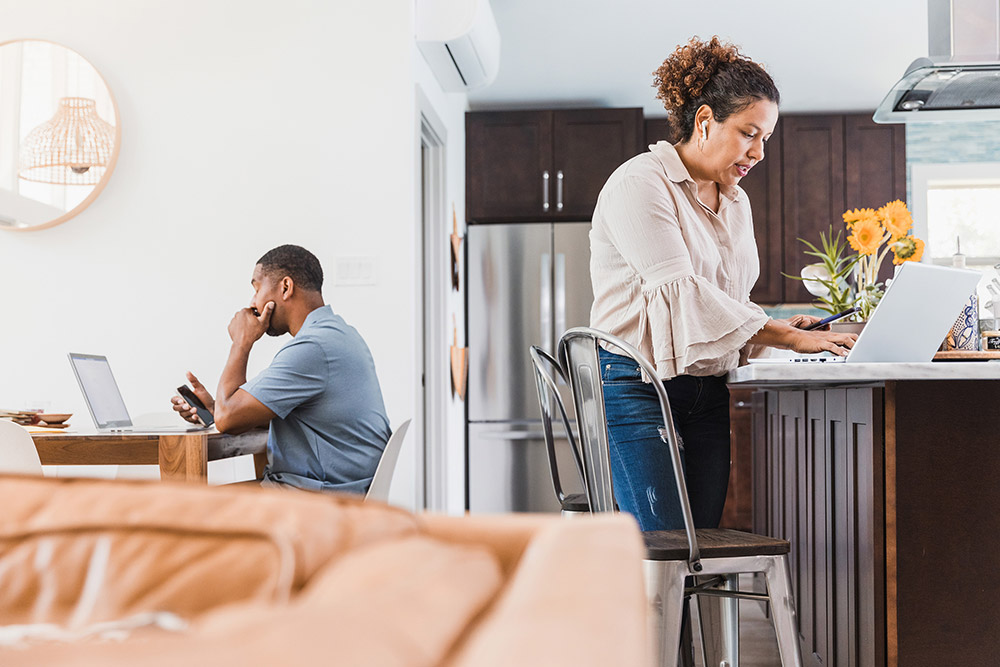兩性社交方式在疫情期間大不相同

即使面對疫情,蔡麗?埃爾韋爾依然把生活過得風生水起。她經營著一家品牌工作室,剛剛搬到緬因州,還是設計網絡小組的候任領導。
每天她都在Facebook和Instagram上跟所謂“媽媽創業邦”的伙伴們聊天。當中一些人成了她的客戶,還有一些人成了她的朋友和介紹人。
和埃爾韋爾不同的是,丈夫道格拉斯主要靠社交網絡來和家人或好友敘舊,而不是與陌生人建立聯系。
在他看來,“Facebook是用來釋放壓力的。他是教科書上典型的內向性格。” 29歲的埃爾韋爾說,“在我來看,接觸陌生人后獲得回應會很有成就感,但他不喜歡那樣。”
這對夫妻的表現是典型的例子,從中能夠看出疫情期間男性和女性社交方式的不同之處。耶魯大學管理學教授瑪麗莎?金是《社交化學:解碼人類聯系的模式》(Social Chemistry: Decoding the Patterns of Human Connection)一書的作者。最初她的研究僅著眼于疫情之前,全面封鎖后她重新訪問研究對象并得到重大發現:人際交往減少了17%,減少的幾乎全是男性之間社交。
她說:“問題不在于社交花了多少時間,其實女性比男性的時間少很多。重要的是時間如何分配。”
她概括了兩性之間的主要差異,疫情期間人們普遍感到孤獨不安的整體趨勢,以及雇主和社交網絡可以發揮什么作用。
? 男性之間的人際關系更偏向事務性:我為你做事,你為我做事。
? 員工分為兩種:能夠把工作和家庭分開的人和二者分不開的人。眼下工作與生活分不開的群體陷于極度職業倦怠。
? 視頻會議給非語言交際帶來極大的壓力,或許重要的交流不適合采用這種方式。
? 社交網絡越大,孤獨感就越小。在公司辦公通常有助于降低孤獨感、極端情緒和回聲室效應,現在更需要發揮積極作用。
男性傾向于建立投桃報李型的人際關系,也就是金稱之為“工具式”關系。例如,《華盛頓郵報》(Washington Post)的千禧一代女性專欄《百合》最近用了這樣一個標題:“女性找人幫忙會先約咖啡,男性則直接張口。”
根據金的看法,在人際關系中,男性會問:“我可以得到什么好處,我的工作目標是什么?”而“女性社交時則有更多的情感交流。危機期間,情感交流的工具性基礎其實比較薄弱。”
疫情期間,女性維持社交方面鮮有好消息。有人生意倒閉。有人丟了工作。有人忙著工作、家庭教育,還要為年邁的父母預約疫苗接種(說的就是“上有老下有小”的一群人),忙得焦頭爛額。還有人完全退出了勞動力市場。
諷刺的是,困境原本給女性造成傷害,如今也推動女性互相幫助。女性利用人際交流加強并擴大群體聯系。
金說:“男性傾向于一起做事來維持社交,比如一起打高爾夫或在酒吧喝酒。女性則傾向于通過交談。”
金發現,疫情期間,如果有5個以上親密聯系就不會感到孤獨。無論現在還是復工以后,辦公室確實能夠促進人們之間溝通,從而幫助建立密切聯系。
隨著本周美國格外關注政治過渡與彌合分歧,公司也要發揮積極作用。金說:“如果說疫情期間社交關系發生了什么變化,就是更加封閉疏離,變得更像回音室。”
有時一些簡單的行為就可以帶來意想不到的效果。比如,打個電話問候員工,讓他們知道自己受到關心,不要總是開視頻會議。金說:“如果真想聯系,不如改為語音,交流起來效果比視頻好得多。”“視頻時人們可能想著‘別讓自己看起來很沮喪’,結果越發關注自己,卻沒那么關心說了什么內容。”
員工通常有兩種類型,也會影響人際交往。所謂的“區分派”會把工作和家庭分開,這類人往往通勤時間更長,按照不同分類的日程表做事。“綜合派”則更喜歡把家庭和工作攪在一起。
對“綜合派”來說,疫情讓他們很難區分“在工作中生活與在生活中工作”,因為很難劃分生活和工作的界限。
這也正是疫情初期恰逢創業的品牌顧問埃爾韋爾遇到的主要問題。“我給自己的壓力太大了。”她回顧了當時的狀態,“然后我意識到自己正在做很棒的事情,能夠全面滋養靈魂,激發了創業精神和創造力,還可以撫育女兒、照顧丈夫和自己。我一定要維持這種平衡。”(財富中文網)
譯者:曉維
審校:夏林
即使面對疫情,蔡麗?埃爾韋爾依然把生活過得風生水起。她經營著一家品牌工作室,剛剛搬到緬因州,還是設計網絡小組的候任領導。
每天她都在Facebook和Instagram上跟所謂“媽媽創業邦”的伙伴們聊天。當中一些人成了她的客戶,還有一些人成了她的朋友和介紹人。
和埃爾韋爾不同的是,丈夫道格拉斯主要靠社交網絡來和家人或好友敘舊,而不是與陌生人建立聯系。
在他看來,“Facebook是用來釋放壓力的。他是教科書上典型的內向性格。” 29歲的埃爾韋爾說,“在我來看,接觸陌生人后獲得回應會很有成就感,但他不喜歡那樣。”
這對夫妻的表現是典型的例子,從中能夠看出疫情期間男性和女性社交方式的不同之處。耶魯大學管理學教授瑪麗莎?金是《社交化學:解碼人類聯系的模式》(Social Chemistry: Decoding the Patterns of Human Connection)一書的作者。最初她的研究僅著眼于疫情之前,全面封鎖后她重新訪問研究對象并得到重大發現:人際交往減少了17%,減少的幾乎全是男性之間社交。
她說:“問題不在于社交花了多少時間,其實女性比男性的時間少很多。重要的是時間如何分配。”
她概括了兩性之間的主要差異,疫情期間人們普遍感到孤獨不安的整體趨勢,以及雇主和社交網絡可以發揮什么作用。
? 男性之間的人際關系更偏向事務性:我為你做事,你為我做事。
? 員工分為兩種:能夠把工作和家庭分開的人和二者分不開的人。眼下工作與生活分不開的群體陷于極度職業倦怠。
? 視頻會議給非語言交際帶來極大的壓力,或許重要的交流不適合采用這種方式。
? 社交網絡越大,孤獨感就越小。在公司辦公通常有助于降低孤獨感、極端情緒和回聲室效應,現在更需要發揮積極作用。
男性傾向于建立投桃報李型的人際關系,也就是金稱之為“工具式”關系。例如,《華盛頓郵報》(Washington Post)的千禧一代女性專欄《百合》最近用了這樣一個標題:“女性找人幫忙會先約咖啡,男性則直接張口。”
根據金的看法,在人際關系中,男性會問:“我可以得到什么好處,我的工作目標是什么?”而“女性社交時則有更多的情感交流。危機期間,情感交流的工具性基礎其實比較薄弱。”
疫情期間,女性維持社交方面鮮有好消息。有人生意倒閉。有人丟了工作。有人忙著工作、家庭教育,還要為年邁的父母預約疫苗接種(說的就是“上有老下有小”的一群人),忙得焦頭爛額。還有人完全退出了勞動力市場。
諷刺的是,困境原本給女性造成傷害,如今也推動女性互相幫助。女性利用人際交流加強并擴大群體聯系。
金說:“男性傾向于一起做事來維持社交,比如一起打高爾夫或在酒吧喝酒。女性則傾向于通過交談。”
金發現,疫情期間,如果有5個以上親密聯系就不會感到孤獨。無論現在還是復工以后,辦公室確實能夠促進人們之間溝通,從而幫助建立密切聯系。
隨著本周美國格外關注政治過渡與彌合分歧,公司也要發揮積極作用。金說:“如果說疫情期間社交關系發生了什么變化,就是更加封閉疏離,變得更像回音室。”
有時一些簡單的行為就可以帶來意想不到的效果。比如,打個電話問候員工,讓他們知道自己受到關心,不要總是開視頻會議。金說:“如果真想聯系,不如改為語音,交流起來效果比視頻好得多。”“視頻時人們可能想著‘別讓自己看起來很沮喪’,結果越發關注自己,卻沒那么關心說了什么內容。”
員工通常有兩種類型,也會影響人際交往。所謂的“區分派”會把工作和家庭分開,這類人往往通勤時間更長,按照不同分類的日程表做事。“綜合派”則更喜歡把家庭和工作攪在一起。
對“綜合派”來說,疫情讓他們很難區分“在工作中生活與在生活中工作”,因為很難劃分生活和工作的界限。
這也正是疫情初期恰逢創業的品牌顧問埃爾韋爾遇到的主要問題。“我給自己的壓力太大了。”她回顧了當時的狀態,“然后我意識到自己正在做很棒的事情,能夠全面滋養靈魂,激發了創業精神和創造力,還可以撫育女兒、照顧丈夫和自己。我一定要維持這種平衡。”(財富中文網)
譯者:曉維
審校:夏林
Caili Elwell is living her best life, despite the pandemic. She runs a brand studio, just moved to Maine and is president-elect of a design networking group.
She spends her days on Facebook and Instagram chatting with fellow “mom preneurs,” as she calls them.” Some turn into clients and others become friends and referrals.
Her husband Douglas, on the other hand, views social media as a way to catch up with family or existing friends versus networking among strangers.
For him, "Facebook is something to decompress. He’s the textbook definition of an introvert,” 29-year-old Caili Elwell says. “I consider it a form of an accomplishment if I can get someone to respond to a cold reachout. He doesn’t like doing that.”
The husband-and-wife pair is a classic case in how men and women are networking very differently through the pandemic. Yale management professor Marissa King is author of the new book, “Social Chemistry: Decoding the Patterns of Human Connection.” Initially basing the work on pre-pandemic research, she revisited subjects after the lockdown and made a stark discovery: Networks had shrunk by 17%—almost entirely among men.
“It’s not how much time you’re spending networking. Women have far less time than men do,” she said. “It’s how you spend it.”
She outlines key differences between men and women, as well as the overall disconcerting trend of loneliness in the pandemic and how employers and networks might help.
? Men’s networking tends to be more transactional: I do something for you. You do something for me.
? There are two types of employees: People who can separate work and home, and those who cannot. The latter is contending with steep burnout right now.
? Videoconferences put a lot of pressure on nonverbal communication and might not be ideal for important conversations.
? The bigger the network someone has, the less lonely they are. Workplaces traditionally help counter loneliness, polarization and echo chambers. They need to embrace this role even more right now.
Men tend to build what King calls “instrumental” relationships, classic tit-for tat. Example: The Washington Post’s millennial women’s section, The Lily, recently declared in a headline, “Women ask for coffee, men tend to call in favors.”
“What can I get out of it? What are my workplace goals?” is what men ask, according to King. “Women tend to have much more emotion in their relationship. And it turns out that instrumentality is a pretty weak foundation during times of crisis.”
That women have hung onto networks is a rare spot of positive news for them in the pandemic. They are losing business. They are losing jobs. And they are losing any semblance of balance among work, homeschooling and hitting refresh to schedule elderly parents for vaccines (I see you, fellow members of the sandwich generation). Some are just dropping out of the workforce altogether.
Ironically, the same conditions hurting women right now might be causing them to turn to each other. Networks serve to reinforce community and amplify community.
“Men tend to maintain their social connections by doing things together,” King said, citing golf or drinks at the bar. “Women tend to maintain their ties through conversation.”
Her research finds that people with five or more close connections haven't experienced loneliness in the pandemic. And this is an area workplaces can help foster connectivity, both now and after the return to work.
As the country’s attention shifts this week to political transition and healing divides, workplaces have an active role to play. “If we talk about what’s happened to our networks in the pandemic—they've become more closed and sealed off,” King said. “They've become more of an echo chamber.”
Something as simple as checking on employees to let them know they are not alone can make a big difference. And don’t always make it a Zoom. “If you really want to connect, shifting to voice-only communication will allow you to connect far better than video,” King says. “Video might make you think, ‘I don't want to look like I’m upset.’ It increases focus on the self, versus what’s being said.”
Workers generally fit into one of two categories that are also affecting networking. So-called 'segmenters' keep work and home separate, tend to have longer commutes and maintain separate calendars. 'Integrators' are comfortable with home and work overlapping.
The pandemic—think "living at work versus working from home”—has been especially tough on integrators, who have a harder time setting boundaries.
This was brand consultant Elwell's main problem in the earlier days of the pandemic and launching her business. "It was pressure I put on myself," she says, in hindsight. "Then I realized I am creating this wonderful thing that feeds every part of my soul, my entrepreneurial, creative and provider sides for my daughter, my husband—and myself. I have to protect that."













